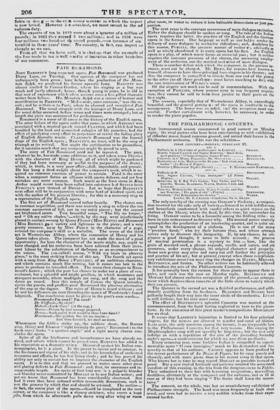THE PHILHARMONIC CONCERTS.
THE instrumental season commenced in good earnest on Monday night : the rival parties who have been entertaining us with exhibitions of &limber music found common ground, and united their forces in the Philharmonic orchestra. This was the selection—
FIRST CONCERT—MONDAY, FEBRUARY 27.
ACT I.
Sinfonia in A (fast time of performance in London)
Duette signor CAToNs and Signor Itowrout.'.Qual desk , Ottsr.ow. goal pensiero " (Corno obligato. Signor Pugs', SEMEnicT. Convert°, in C Minor. Piamainte, Mr. Nlosc et.ts SESTOUVESI.
Recitative el Aria. Mademoiselle 10.*ste," Deli vieni, non tardar "( A'orre di Figarol MOZART. Overture (Midsummer Niyht's Dream) F. M ENDELsSOOSt- BARTROLOY. in D Sinfonia ACT. II.
SIM:HOVEN.
Avis, Signor CATUNE, " Cara immitgine" (ii Room Magico) MOZART. Quimetto, in E Bat. Two Violins, Two Violas, and Nicest*. SLAGRoVE, WATTS, DANDO, 1.vos, and
LINDI.EY MOZART.
Terzetto, Mademoiselle 1111,Ams. C cross, and Sig.
smlovEN.
WSBLIt.
nor Rorrento." Fie grata at net (Fidetie)
Overture," tier Belierreclwr der Geister "
Leader, Mr F. CRAMER—COIldlielOr, Sir U. SMART.
The only novelty of the evening was ONSI.ow's Sinfonia ; a composi-
tion inserted for the sake only of variety,—listened to with indifference, and henceforth condemned with sundry others to quiet repose on the shelves of the library, where the dead, by this time, far outnumber the living. ONSLOW seems to he a favourite among the fiddling tribe : we have in vain endeavoured to discover why. His musical power scarcely accomplishes the production of an interesting quartet, and is quite un- equal to the development of a sinfonia. He is one of the many " 'prentice hands" who try their fortune thus, and whose attempt serves only to discover their incapacity. If, by any chance, he mi. ginates a good thought, it turns to little account : the process of musical germination is a mystery to him how, like the grain of mustard-seed, a phrase expands, swells, and varies, and yet preserves, under every change, its original character and property. Some new genius may arise and carry out still further the principles and practice of his art ; but at present (except when these complimen- tary exhibitions occur) we must ring the changes on HAYDN, MOZART, BEETHOVEN, and Smile. No other writers can be habitually allowed to introduce the acts of the Philharmonic Concerts.
It has generally been the custom for these giants to appear there in pairs, and such was the case on Monday night. BEETHOVEN and MOZART had almost exclusive occupation of the ground,—an arrange- ment which deprives these concerts of the little claim to variety which they can possess. The Quintet in the second act was a finished performance, and addi- tionally gratifying from its freshness. BLAGROvE and DANDO have gallantly fought their way into the inner circle of the orchestra. LUCAS is Still without., but his turn must come.
The effect of BEETHOVEN'S splendid Concerto was marred at the commencement, from the band having neglected to tune to the piano- forte. In the execution of this great muster's compositions MOSCHELES bus no rival.
It seems that LAPORTE'S injunction is limited to his four principal
singers, for the minors are allowed to wander and carol ad libitum. LABLACI1E, the only musician among the former, is an irreparable loss to the Philharmonic Concerts, for that very reason. His singing the Mephistopheles song will not speedily be forgotten ; but the rest only indulge us with a repetition of the airs of the preceding Saturday night's opera—a condescension for which we owe them no thanks.
Every returning year, some luckless Italian is compelled to experi-
mentalize upon " 0 care immitgine," much to his discomfort and fre- quently to that of his auditors. CATONE appears to have profited by the recent performance of Le No:::.e di Figaro, fur he sung purely and chastely, and with tnore gusto than in his recent essay in that opera.
Who knows but in time he may regard MOZART as passable instead of
passe. But a new trial of fortitude and putience awaited the associated vocalists of this evening, in the trio from the dungeon-scene in Fidelio. They submitted to their fate with becoming resignation ; mut yelling, doubtless, alternately at the composer :it'd the utidience, and es ill at ease as if they had been singing " The flocks shall leave the moun- tains." The concert, on the whole, was but an unsatisfactory exhibition of Philharmonic strength. The band was more frequently at fault than usual, end once had to receive a very audible rebuke from their expe- rienced lea der.


























 Previous page
Previous page